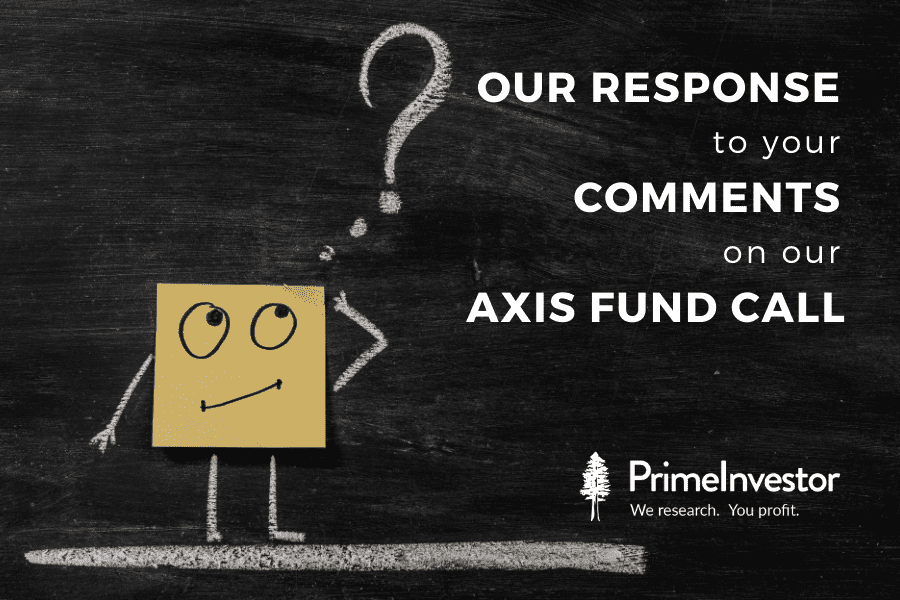We upset a few of you with our call on some of the Axis funds last week 😊 Some of you commented on the blog and others raised tickets. We thought it would be better for us to respond through an article for the benefit of others as well.
Here are a couple of sample comments from folks who seemed pretty disturbed.
“Frankly, I’m little appalled by your call “exit on Axis Smallcap”. You are not a weathercock, are you? You are an analyst. There has to be some gravity in your analysis. Yes, as an analyst you run risk of being told “why you did not warn us”, so warn if you need to. An exit call now is so premature as to promote flip-flopping. If anything, the Franklin debacle has proved that investors got fair returns on investments, albeit with protracted wait. I think you must have qualified who needs to exit and who does not rather than promote a scare among concerned investors. Do your job and your job is not scare mongering.”
“I am afraid that your analysis is half-hearted. It seems you want to stay aloof when it comes to risk”.
***
Franklin was an incident that was unfortunate to happen to debt funds in the MF industry. Prime Investor panicked and told investors to redeem even from equity funds. Are the equity funds not performing well? The funds in question with Axis MF is between 0.01% and 0.04% of the industry assets. We have seen issues with banks, corporates, etc. and the same will continue in future. Will there not be any problem with other AMCs in future? Can the regulator guarantee that all issues with AMCs be monitored stringently to ensure that no issues would arise in future? If we are scared of such risks, then retail investors should not be investing in Mutual Funds.
Please post crisp articles and give a clear message that is helpful to investors at large instead of scaring them.”
We had this and several other comments and queries. We thought we could list our responses here together.

#1 Comparing with the Franklin episode
Comparing the current Axis issue with the Franklin event, in our view, is not quite right. The governance issue involved was significantly different. Franklin was a case of an AMC reneging on the promise of liquidity that is given by any open-ended fund to a retail investor. It closed its funds without any warning or approval. It did this at a time when other AMCs were also facing the liquidity issue in the debt market.
It did this because it took credit risk across its funds, irrespective of the duration of the fund. It did this knowing liquidity can be a big risk in the Indian debt market. Yes, liquidity is a big risk that investors take in bonds. But not in mutual funds.
Next, our first call on Franklin debt funds dated back 2 months before the Franklin fiasco happened. We gave our call based on some of their funds’ exposure to Vodafone papers. It was a proactive call. Second, some of the Franklin equity funds were already a sell in our tool.
The reason we stopped rating the fund house post the event was a qualitative call, given the way the fund house had handled the issue. We did not think the fund house would close down but we did mention management change as a risk. The fund house has also lost equity fund managers since.
We had no reason to panic. We were simply using the stick we could, batting for the small investor, for what we considered as an unfair practice by an AMC – that of punishing retail investors, many of whom had their income portfolios in those schemes.
But yes, the Franklin AMC issue is indeed a good example of why exit is a good course when governance issues are flagged. Yes, people received their principal back – after a 2 year wait with marginal 3% returns after losing their liquidity! We certainly want our subscribers to have a better experience!
Axis AMC’s allegations are of a far different kind – squarely based on unethical and illegal business activity by individuals in the firm for frontrunning of stocks. A comment in our blog that said these are part of market risks is a wrong notion and should be dismissed. Mutual funds are subject to market risks. Investors do not come in fully expecting risk of fund managers frontrunning stocks!
Yes, there is a regulator to protect the investor from risk of fraudulent and unethical business practices, but no regulation is foolproof, and investors therefore end up facing risks outside of market risks. Our job as analysts is to reduce such risks post-event, where we have no way of identifying them pre-event (like we did with Franklin).
The Axis issue is not one where your money will be locked and returned later like Franklin’s. But it is one where you may lose money. You may see losses as flight of money in equity is swift in stocks where front-running is rumoured. Here, there is no question of the AMC returning such money or making good the losses – it becomes a market risk. So, the risk in Axis is that of real loss of money or loss of future returns.
#2 On our seemingly ‘hasty’ call on Axis funds
Some of your reactions range from accusing us of scaremongering, giving half hearted calls and being weathercocks 😊
First, we acknowledge (and in our recent article on our call too) the superior performance of many Axis funds. We have not issued the calls as an immediate reaction – we have deliberated much before doing so. Many of you had been writing to us from the day the event was publicized on what you should be doing, but we decided to take our time to respond.
We did this to understand outflow patterns, stock hits, performance etc. We studied the portfolios of the funds to weigh the risk in each of them as far as NAV hits from stock falls or stock liquidity issues were concerned. We considered performance in cases where performance was already showing concern. We did all this as our intention, much as you may think otherwise, is not to unnecessarily scare you or cause too much churn in your portfolio.
Second, we clearly outlined 4 risks that may emerge due to market rumours and fear, even if this does not become a full-fledged corporate governance issue. Those risks (that we have detailed in our earlier article) are:
- Redemption pressure
- Impact cost on illiquid stocks
- NAV hit from stock fall
- Poor inflows
This apart, when a fund undergoes such allegations, future inflows also get impacted. We weighed the challenges arising from this against future performance, in relation to their peers. We considered only those categories where this risk was higher. Yes, none of these risks may materialise. But when risks are evident, why get stuck with these funds when you have other options?
And therefore, our calls were to mitigate the risks in your funds. Our calls were also only on those funds where there was a higher risk of performance taking a hit. We have not made an AMC-wide call. We gave an exit call on just one fund. We moved two others to a hold. If we had half-hearted calls, we would not alert you in the first place😊In fact, it would be half-hearted if we acknowledged the risks and then asked you to decide what to do for yourself – having issued the original investment recommendation!
Whether the risks transpire or not is not something we want to assign weights to, because there isn’t enough information to do so.
But when we take these calls, we gladly prefer to err on the side of caution. At PrimeInvestor our philosophy has been to deliver returns but by first cutting down risks. Churning a portfolio and paying nominal taxes (for equity funds) is a small price to pay and it does not hurt much at a time when some profit booking is a sane thing to do in the current market environment.
We take our mission of protecting and growing investor portfolios seriously. Taking such difficult calls, when they are merited in our opinion, underscores the independence of our opinion and sincerity of our efforts.
#3 On our risk strategy and why we go against buy-and-hold
One of the questions we had was what risk management we had in place to identify such events. Honestly, we can try (not always) to identify risks in the portfolio. But frankly, to identify front-running activities is beyond our capacity as these are per se activities done without leaving much trace.
Where we can identify risks is in portfolio quality. Credit risks, poor investment decisions, concentration risks and such are somewhat identifiable. We place weights to such risks in our ratings. We do have a mechanism of identifying credit downgrades of instruments in debt funds, AUM loss, checking for liquidity in stocks of equity funds and so on. We do watch performance change and portfolio change when fund manager changes happen.
Next, on the buy-and-hold strategy – we urge you all to read what we think about this strategy here. We are not sure why there is so much furore about exit calls. Most of you ask us about profit booking when funds perform well. But when we highlight possible risks, we are accused of churning or creating a scare!
Folks, don’t get too attached to funds. Get attached to your portfolio. Compounding rewards you, as long as you stay invested. It does not treat you any better for sticking to the same fund!







30 thoughts on “Our response to your comments on our Axis fund call”
Hi, given the developments or lack of, in the past 3 months, would you revisit your recommendation on the Axis Small cap and Midcap funds? What would be your threshold to consider the risk as passed?
Unlikely sir. There are enough options. We will wait to watch fund flows and performance. Vidya
Hi Vidya,
Thanks for the call and for responding again to explain the reasoning. My initial thoughts were the funds affected are different, so I shouldn’t bother. But then after going through this article, I thought I better be safe and should not be attached to the fund names. I haven’t exited from Axis Small Cap but stopped my SIP.
In the email I got from Axis confirming my SIP stoppage, I see the below quote in their email Signature. I think I am being ‘responsible’ by stopping my SIP at least based on the news and not 100% transparency from the fund.
“Markets don’t create Wealth, Responsible Investing does”
Regards
Everyone doesn’t understand the fine details of money matters and as a leader / guide its the responsibility of PI to raise a red flag at the correct time.
If one feels that the call given is wrong then it’s their wish to follow or reject that call. Some of us redeemed all the money from all schemes, some – only from the red flagged scheme and some didn’t withdraw at all. It’s completely our own wish. No need to badmouth the guide.
It is something like paying a doctor and then questioning the doctors instructions. If we have paid and come to doctor, then it means that we agree that the doctor knows better than us. And therefore its prudent that we follow the orders of that doctor.
Kishan
I fully appreciate your stands in both Franklin and Axis issues. After all a good investment strategy necessarily includes protecting one’s capital. Your role is to identify not just investment opportunities but also suggest timely exits. Some of your calls may look ill timed with the benefit of hindsight. But at the time they were made, I think all available information was taken into account and a stand taken.
🙏
I agree with Prime speaking from a neutral position. I am sure you have nothing to gain, by giving a red alert . As Investors we are always paranoid when it comes to negative news , since we keep hoping that luck is always on our side. It is something like betting that CSK will always be the super winner!!!Beware all kings ( Kohili, Rohit, Dhonl, Jaddu fail one day )
Nice analogy 🙂 thanks! Vidya
Ms. Vidya Bala, As on date, one year return of Axis Long Term Equity ELSS fund is negative 1.5% which is worst among 95% of all mutual funds scheme. Did you notice that on the day of this Axis saga broke out a month back, this ELSS scheme fall by 4.5% as against 1.0 – 1.6% all other schemes? What are your comments, as this scheme is in your recommended schemes for long time and has Rs.32000 crore AUM?
Hello Sir, that fall is in line with market fall. Please see the table where we have given the fund fall along with market index fall and AUM fall. That will help clarify. AUM is not a concern for large-cap biased funds. thanks, Vidya
Respected Madam,
You only analyze the situation. Decision will be taken by paid subscribers. Your previous article is not panic creating one. If you have panic creation intension, we should not have trust on your channel. The situation is changed as and when required in stock market. There is no rule of stick to fund.
SANDIP BOSE
🙏 thanks, Vidya
@kshah1984 Yes, not going to exit the best performing smallcap fund as well. One needs to think about various factors such as taxation against the perceived risk. In case of Franklin, except for the specific funds that were affected, I believe all other funds are still available in the market. It would be interesting to see how their performance got affected, if at all. Hope SEBI heavily penalizes the erring fund managers so that others dont even think about it.
Comments are closed.